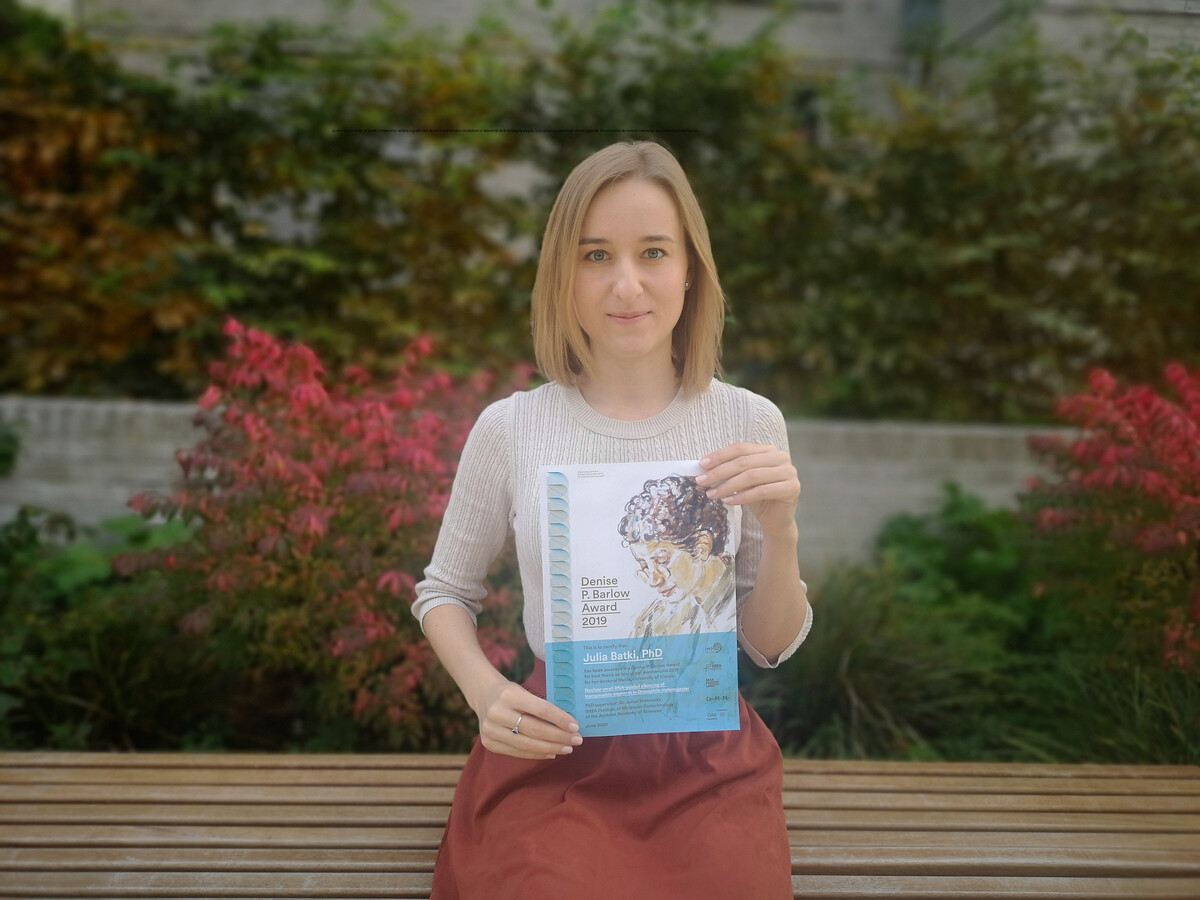DENISE P. BARLOW AWARD 2019 FOR JULIA BATKI
Julia, originally from Hungary, came into first contact with the Vienna BioCenter during the VBC Summer School in 2013, at which time she successfully applied for an internship in the Brennecke lab at IMBA. “I knew this is the place where I want to pursue my PhD. The following summer, I applied to the VBC PhD program and then started my PhD in October 2014” says Julia, visibly enthralled by her experience in the Brennecke lab at IMBA.
She completed her undergraduate studies in chemistry in Budapest, and her fascination with biological systems and mechanisms led her to transition to molecular and developmental biology for her master’s degree. During that time, she researched nucleotide metabolism and DNA repair pathways in Drosophila at the Institute of Enzymology in Budapest.
It was not long after starting her PhD in the Brennecke lab that exciting discoveries began to unfold for Julia. One such example is her finding of a housekeeping gene variant being repurposed as a transposon repressor in a pathway also adapting a novel protein, one that is not found outside of select insect species. Julia also showed that the host’s general cellular heterochromatin machinery was employed as the downstream effector to prompt transposon repression. “Doing research in piRNA biology, of course, helps to understand how transposons are repressed. Moreover – and this is the part that fascinates me the most – it always holds the promise to learn about various general cellular processes and venture into unexpected areas. This is due do the fact that the host needs a lot of innovation in order to fight transposons in this evolutionary battle. In my case, I aimed to study transcriptional repression and heterochromatin formation via piRNAs, and it turned out that the host adapted a variant of the cellular mRNA export machinery for piRNA-guided nuclear transposon silencing. What a surprise!” in Julia’s words.
Julia successfully defended her PhD thesis entitled: "Nuclear small RNA-guided silencing of transposable elements in Drosophila melanogaster" in 2019 and her findings were published in the journal Nature Structural and Molecular Biology. Her PhD received recognitions in the form of different prizes, such as the Kirsten Peter Rabitsch Award and, more recently, the Denise P. Barlow Award. Julia is currently a postdoctoral researcher at the Max Planck Institute for Molecular Genetics in Berlin.
The award is named after Denise P. Barlow, a leading figure of the molecular biology field in Vienna, having been associated with four Viennese institutions, IMP, Max Perutz Labs Vienna, IMBA and CeMM. The award seeks to recognize merit and manifest appreciation of exceptionally interesting PhD theses carried out in one of the four institutions. It is worth 5000 Euros and awarded yearly starting 2019, the year of the first Denise P. Barlow Award call. Exceptionally for the first round, the jury decided for two awards, the second one being granted to Matthias Muhar, PhD, alumnus of the Zuber lab at the neighboring Research Institute of Molecular Pathology (IMP).
About IMBA
IMBA - Institute of Molecular Biotechnology - is one of the leading biomedical research institutes in Europe focusing on cutting-edge stem cell technologies, functional genomics, and RNA biology. IMBA is located at the Vienna BioCenter, the vibrant cluster of universities, research institutes and biotech companies in Austria. IMBA is a subsidiary of the Austrian Academy of Sciences, the leading national sponsor of non-university academic research. The stem cell and organoid research at IMBA is being funded by the Austrian Federal Ministry of Science and the City of Vienna.
